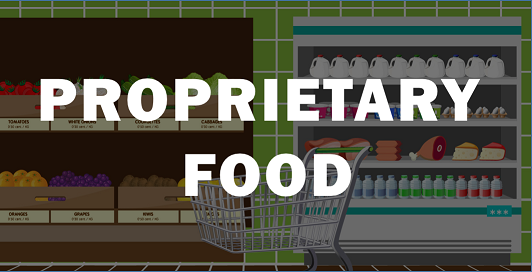Table of Contents
Regulatory Guidelines for Proprietary Food in India

Food Safety and Standards Authority of India (FSSAI) is actively working in rendering safety and nutritiously balanced food to the people of the country. Recently, the new guidelines for proprietary food in India came into force from August 22, 2016.
The standards for proprietary food come under the direction of Section 16(5) of Food Safety and Standards Act, 2006.The amendment relates to the clause 2.12.1 pertaining to “Proprietary Food” of Food Safety and Standards (Food Products Standards and Food Additives) Regulations, 2011.1
FSSAI updated the guidelines by taking into consideration comments and suggestion from various stakeholders involved with proprietary food business.
This step is taken by FSSAI to facilitate the culture of innovation and growth in the food industry and to increase the wide basket of food items available to food consumers.
The regulations are required to be followed by all State and Central authorities and all food business operators related to proprietary food.
Background of Proprietary Food products
FSSAI regulations categorized food and beverage products into two major classifications:
- Standardized Food
- Non-standardized foods (Proprietary Foods)
| Standardized Food | Proprietary Food |
|---|---|
| Standardized food products are those which are defined under regulations. For examples, fruit jam, fruit drinks, sauces, biscuits and carbonated water, etc.2
A food business operator who has license can manufacture and sell these food products as long as he complies with the standards for the specific product given in the act and rules. |
Proprietary Foods are those which are not standardized under regulations and may contain primary ingredients and some generic additives. For examples, energy drinks and custard powder which contain starch, dextrose, flavor and colour.
These foods can be made from milk or milk products, from carbohydrates, with or without a basis of milk, from meat, fish, or eggs, from vegetables, fruits, or nuts, and sometimes from fatty substances. In some instances the food product is merely modified, in the relative percentages of its component parts. |
In the new guideline about proprietary food, nutraceuticals, health and dietary supplements such as fortified foods will no longer be considered as proprietary food by food regulatory of India (FSSAI). They will come under separate category.
FSSAI has amended regulations to fix loopholes in the definition of proprietary food, under which approval is taken for several nutraceutical and health supplements as proprietary food.
Some Quick Facts about Proprietary Food updated in the new guideline
What is Proprietary Food?
According to FSSAI, proprietary food is defined as an article of food that has not been standardized under these regulations, but does not include any novel food, foods for special dietary use, foods for special medical purposes, functional foods, nutraceuticals, health supplements and such other articles of food which the central government may notify in this behalf.1
Microbiological requirements of Proprietary Food
The proprietary food products should comply with the microbiological requirements specified in Appendix B of the new updated regulations. In cases, where microbiological standards are not specified for the proprietary food product in Appendix B of the guidelines then there the food products should not contain any pathogenic organisms that can be unhealthy for consumers.
In addition to that, Proprietary food should follow the provisions under Food Safety and Standards Act, 2006 regulations. There should not be any health claim coming from any stakeholders of the food product in respect of product label or from any other perspective regarding the proprietary product.
Who shall be responsible for the safety of the proprietary food?
It is important to look after the safety standards of proprietary food as it will be available for human consumption. Food Business Operators are solely responsible for safety of the proprietary food. If there is any deviation in the quality parameters of the proprietary food product according to the Food Safety and Standard Regulations made under the Food Safety and Standards Act, 2006 then the product will not be designated as a Proprietary Food.
For any knowledge and assistance regarding Proprietary Food and its recent regulations in India you can contact CliniExperts, your food regulatory partner.
Please feel free to call at (+91-11-40536928) and mail us at (contact@cliniexperts.com).
Reference
- 1.Direction Proprietary Food 22.08.2016. Available at: http://www.fssai.gov.in/Portals/0/pdf/Direction_Proprietary_Food_22_08_2016.pdf Accessed 19th September 2016.
- 2. Indian Food Code 25.06.12. Available at: http://www.fssai.gov.in/portals/0/pdf/INDIAN_FOOD_CODE(25-06-2012).pdf Accessed 19 September 2016.
Saurangi is a food regulatory expert with 8 years of experience. She shares her knowledge and insights on regulatory updates, food trends, best practices, and news. Follow her for expert insights and practical advice on all things for food regulatory
Saurangi Shah
CliniExperts Services Pvt. Ltd.
Recent Posts
Organic Food Labelling In India| Certification, and Import of Organic Food in India

This Article is All About Organic Food Labelling In India and Certification, and Import of Organic Food in India. Explained in Detail About What is Organic Food labelling? Summary Short Description Wi..
Cosmetic Label Compliance India : A Guide to Compliance

Introduction Looking for Cosmetic Label Compliance India? Are you a cosmetic manufacturer or importer navigating the complex world of Indian regulations? Ensuring your product labels comply with the l..
Clinical Investigation Approvals: An Overview of Forms MD-22 and MD-23

Summary Short Description Strict regulatory protocols govern clinical investigations for medical devices. Central to this process are forms MD-22 and MD-23. Form MD-22 is an application to Central Lic..
HAVE A QUERY?
REACH US!Office
New Delhi
Unit No. 324 & 325, City Centre Mall, Plot No. 5, Sector 12, Dwarka, India - 110075
+917672005050
Bengaluru
RMZ Galleria, 1st floor, Ambedkar Colony, Yelahanka, Bengaluru, Karnataka, India – 560064
Call us on
Sales: +91 7672005050
Reception: +91-11-45214546
Timings
9 am to 6 pm (Monday to Friday)


